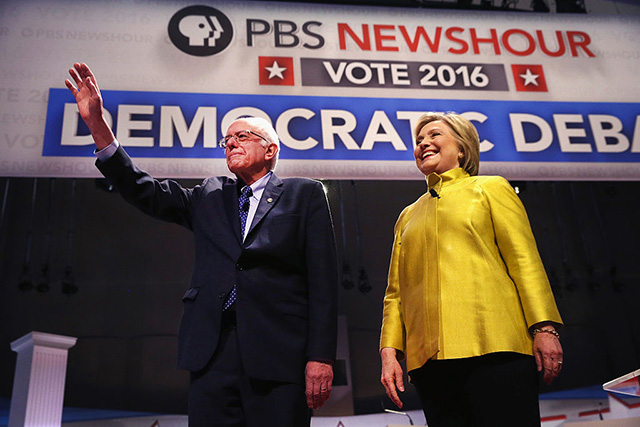The Highlights From Sanders' And Clinton's Heated Milwaukee Debate
By aaroncynic in News on Feb 12, 2016 4:24PM

Democratic presidential candidates Senator Bernie Sanders and Hillary Clinton at the debate in Milwaukee. Photo by Win McNamee/Getty Images.
Clinton, the establishment favorite, has had a contentious competition with Sanders in the two weeks, with a near tie for votes at the Iowa caucuses and a loss in New Hampshire. Both campaigns now head to compete for votes in more diverse states such as South Carolina.
Clinton sought to paint herself as the more experienced of the two, leaning heavily on times she advised President Obama on issues, and pointing out criticisms Sanders has made of him.
“Senator Sanders said that President Obama failed the presidential leadership test,” said Clinton. “And this is not the first time that he has criticized President Obama. In the past he has called him weak. He has called him a disappointment.” She later added this was the “kind of criticism that we've heard from Senator Sanders about our president I expect from Republican.”
“Madame Secretary, that is a low blow,” responded Sanders.
While certainly far from the most substantive discussion in the debate, the exchange shows both contenders will end up spending plenty of time attempting to show who can best hold up the president’s legacy, should they succeed him. On that front, Clinton turned to a familiar talking point, saying a Sanders presidency would force the country to “start all over again” in making health care affordable for Americans, and claiming ownership of the Affordable Care Act.
“ You know, before it was called Obamacare, it was called Hillarycare,” she said. And despite taking in heaps of money in campaign donations from both the insurance and pharmecutical industries, she added “I took on the drug companies and I took on the insurance companies to try to get us universal health care coverage.”
On the issue of campaign donations, a typically strong talking point for Sanders given his reliance on small donors and refusal to take money from Wall Street or large corporate donors, Clinton attempted to downplay the idea that big money from banks would have big influence, leaning on Obama.
“I debated then Senator Obama numerous times on stages like this, and he was the recipient of the largest number of Wall Street donations of anybody running on the Democratic side ever,” said Clinton. “When it mattered, he stood up and took on Wall Street.”
The Vermont senator, who has made taking on money in politics the central issue of his campaign, scoffed at this:
“Let's not insult the intelligence of the American people. People aren't dumb. Why in God's name does Wall Street make huge campaign contributions? I guess just for the fun of it; they want to throw money around.”On foreign policy, an area where the former Secretary of State tends to dominate, both candidates gave history lessons. Clinton countered Sanders’ familiar talking point of voting against the war in Iraq by pointing out his votes in favor of “regime change resolutions” in both Iraq in 1998 and Libya. In a bold counter move, Sanders criticized Clinton for her relationship with Henry Kissinger. Calling him one of the “most destructive secretaries of state in modern history” because of his actions in Cambodia that lead to the slaughter of 3 million people, Sanders said:
“I am proud to say that Henry Kissinger is not my friend. I will not take advice from Henry Kissinger.”
Meanwhile, outside Helene Zelazo Center for the Performing Arts at the University of Wisconsin-Milwaukee where the debate was held, hundreds of demonstrators, many allied with the Fight For 15 movement, converged. Kyesha Lee, a Milwaukee McDonald's worker, told the Wisconsin Gazette:
"I never thought my voice could make a difference. The fight for $15 has shown me that’s not true."
Sanders supports a $15 an hour minimum wage, while Clinton supports $12.